When it comes to human trafficking, we’ve all heard the stories. White passenger vans trolling neighborhoods, zip ties on vehicles used as markers in the Target parking lot, abandoned car seats or strollers meant to lure concerned passersby. Unfortunately, these viral stories — often shared by well-meaning citizens on social media — do much more harm than good.
“In the United States, less than 3% of human trafficking cases are abductions,” said Jodi Wahba, engagement specialist for Shield North Carolina, a local nonprofit dedicated to the fight against human trafficking. “That means that 97% of the time it’s the family member, the romantic relationship, the neighbor, the friend. It is not a stranger. It’s a great myth for traffickers; they love that.”
Shield North Carolina believes that everyone can help shield their community if they simply know what to look for and how to respond. In other words, knowledge is power.
Myth busting is one of the biggest parts of Shield NC’s prevention and education efforts. While the concept of stranger danger is valid, human trafficking often flies under the radar in the United States due to people fearing the unknown rather than the familiar.
“I live in Apex, and everybody’s afraid to let their kid bike downtown,” said Wahba. “I’m like, downtown Apex is so safe. Let them bike. Don’t worry about them in downtown Apex. Worry about who they’re talking to on their phone. Pay attention to who they’re in a relationship with.”
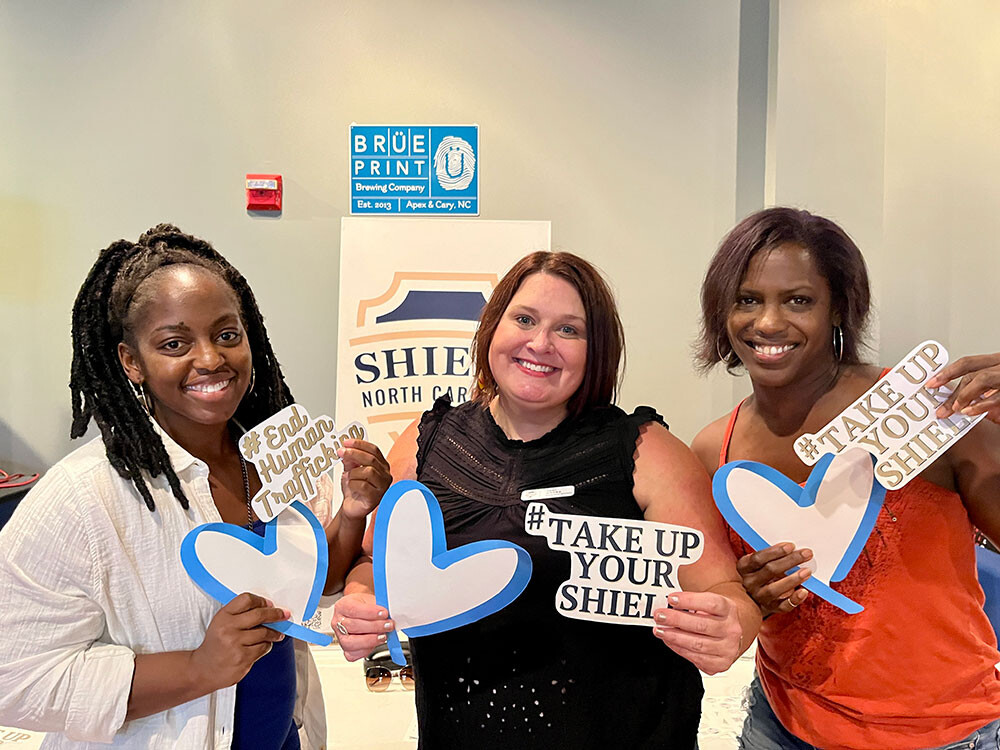
From left: Candace Rowlett, Jodi Wahba, and Chelsea Gibbs attend a fundraiser at Brueprint Brewery for World Day Against Trafficking in Persons.
Envisioning a future where “all North Carolinians are free,” founder Nicole Bernard started Shield NC almost six years ago after recognizing the need for an organization that would help everyday people better protect their communities.
“North Carolina consistently ranks in the top 10 states for reports of trafficking,” said Bernard. “Because of the pandemic, we are seeing vulnerable people becoming even more vulnerable and there is even more work to be done.”
Human trafficking is defined as the unlawful act of transporting or coercing people in order to benefit from their work or services. By definition, trafficking has to involve one of three categories: force, fraud, or coercion. Labor trafficking, for example, might involve false promises regarding working conditions, fraudulent contracts, or other misleading practices. Sex trafficking involves the recruitment, transportation, or harboring of individuals for the purpose of sexual exploitation.
“Trafficking is prevalent here, and it’s prevalent all around,” said Wahba. “The more vulnerable people are, the more vulnerable they are to being trafficked. Vulnerabilities happen when basic needs aren’t being met, like food and shelter. With the cost of living going up so high, the housing and food insecurities in the Triangle have gone up considerably in the past three years. When housing and food vulnerabilities or insecurities are increased, their vulnerabilities are increased. So that is something that we’re looking at and working on — trying to put things in place as quickly as possible to help in that prevention mode. If we reduce the demand then we will also reduce trafficked individuals.”
While many human trafficking organizations work directly with survivors, Shield NC focuses on community empowerment, prevention, and advocacy. Human Trafficking 101 sessions are offered both online and in person for companies, organizations, and social groups.
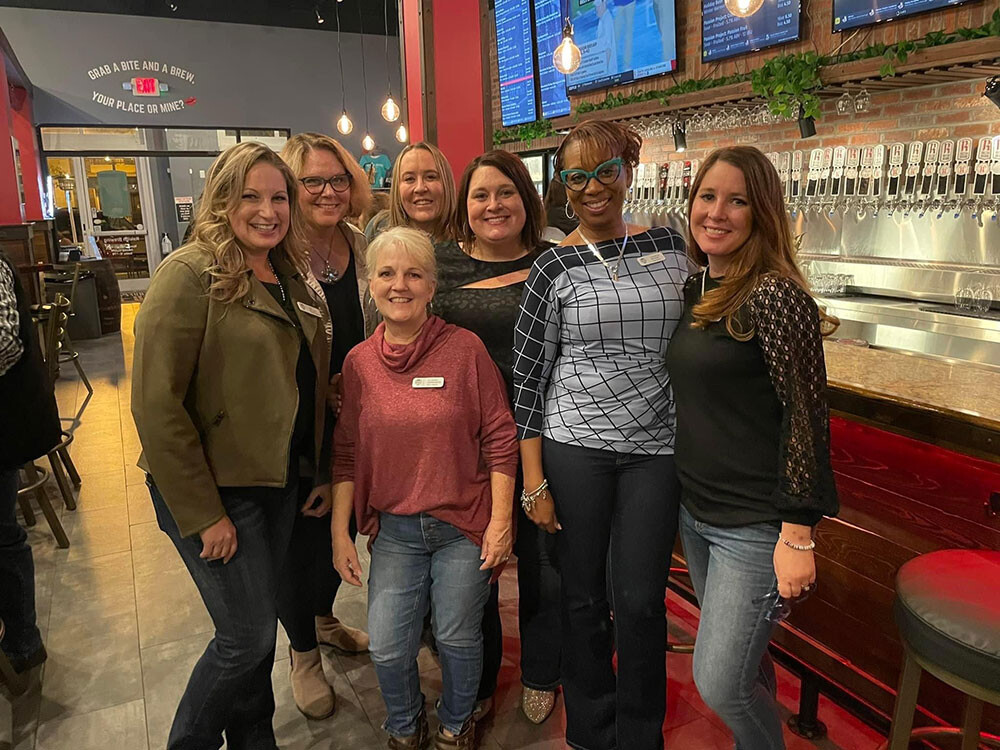
From left: Niki Miller, Heidi Stern, Jennie Kowaleski, Jodi Wahba, Luaskya Nonon, Nicole Bernard, and Alison Horowitz (front) attend Shield NC’s 5th Anniversary party at Raleigh Brewing.
“Learn more and then advocate for your community to be aware of trafficking,” said Bernard. “Trafficking is occurring in every community in our state, but it often goes undetected. Sometimes it is hidden in plain sight. With targeted training to help groups identify and respond to trafficking situations, the crime can no longer hide. We provide training that is specific to signs that certain community members might see. For example, training for medical professionals might be very different from the education we offer to apartment staff. Both professions may be exposed to trafficking, but they need to be educated on the very specific, but different, signs they may see. Shield NC offers more than 25 different trainings that are geared toward community members who are most likely to see trafficking.”
Shield NC’s prevention efforts include the Service Groups and Faith Alliance (SGFA), a collaboration between Shield NC and the Apex PD, and the Demand Reduction Task Force.
“We have a SGFA in Apex, but the ideal is that it gets duplicated in different areas in NC,” said Wahba. “It brings together different community groups, different leaders within the town or city, and different faith groups. You learn about a need or a vulnerability in the community, and together you kind of come up with the best solution for that area. What can we all do together to prevent this vulnerability? We work together to come up with creative solutions and have stronger protection around our community.”
Shield NC also co-founded the Demand Reduction Task Force, the state’s first task force meant to reduce the demand for commercialized sex and forced labor.
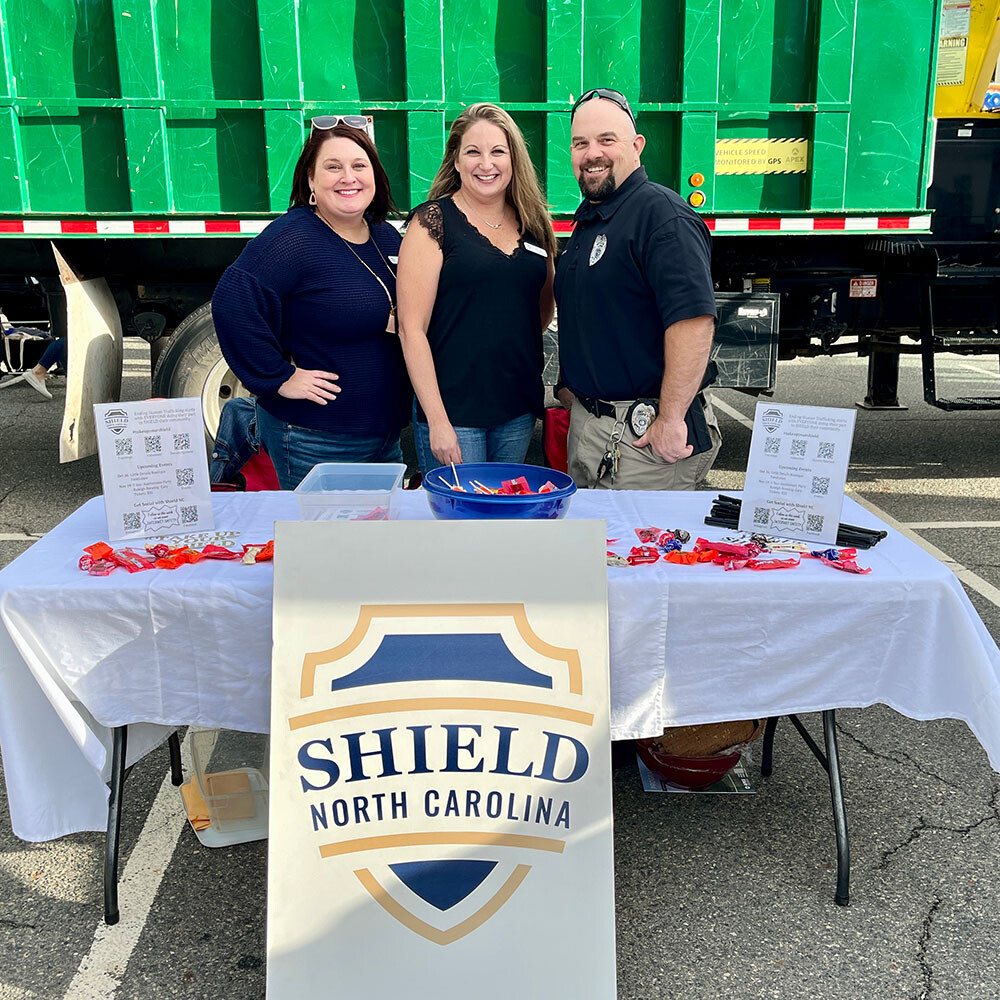
From left: Niki Miller, Jodi Wahba, and Kenneth Ragland at Apex Night Out
“If we can figure out how to effectively reduce demand, that’s when hopefully we can start to reduce the amount of individuals who are trafficked, and that includes things like labor trafficking,” said Wahba. “For example, when products are cheaper than they should really be, there might be a reason. How did that company pay to make that product and sell it at this price? So understanding that and understanding why prices are the way that they are, and also holding people accountable, is extremely important.”
Advocacy is also a huge part of Shield NC’s mission — influencing policy and legislation changes at the local, state, and federal levels and partnering with companies to help establish a safe working environment for survivors of human trafficking.
“We push for different types of policies to be in place to help prevent or help resource survivors,” said Wahba. “We’ve done this in different ways. For example, together we were able to work with the Town of Apex — and now any contractor who works with the Town of Apex has to agree that there will be no labor trafficking and no goods sold that have been trafficked. We also advocate for state-level changes. We were part of what changed the law in NC — now when rape victims are on trial, their previous history cannot be asked about anymore. Shield had a big part in that.”
When it comes to trafficking in our communities, Shield NC encourages everyone to #TakeUpYourShield. In other words, educate yourself, advocate for survivors, and be the change this world (and state) needs to see.
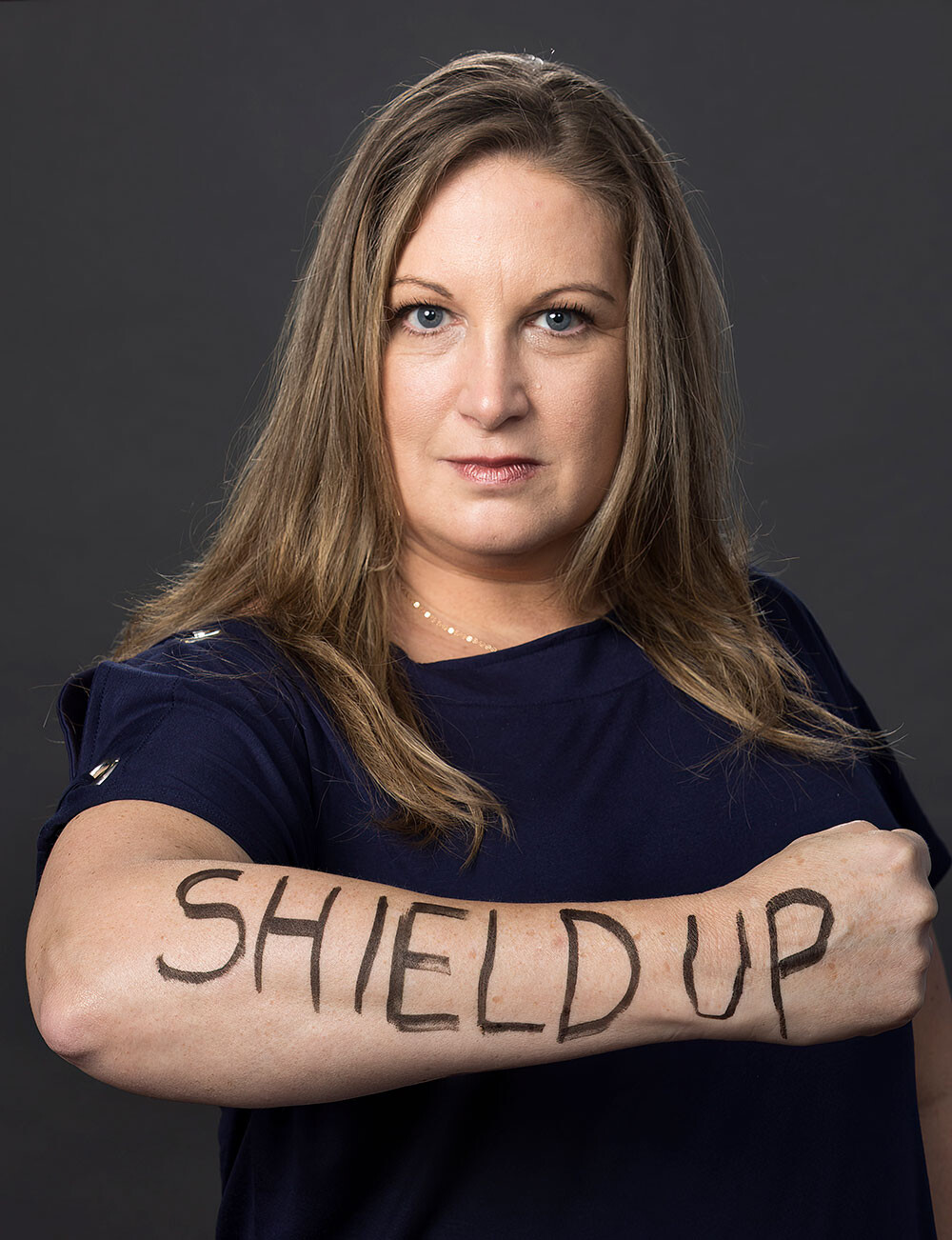
Niki Miller, Operations Specialist
When it comes to volunteering with Shield, the opportunities are endless — from becoming a trainer, helping with social media, or even making lunch for an SGFA meeting.
“Request Human Trafficking 101 training for yourself. It is free, but we accept donations for our trainers’ time,” said Board President Jennie Kowaleski. “Donate. Ask your employers to match your donations. Nominate Shield for work-supported grants. Sign up for our newsletter so you can be in the know of what we are doing and what we need help with. Follow us on socials!”
But above all, be aware.
“It’s happening all around us. It’s happening right in our hometowns,” said Wahba. “It’s happening to individuals that we know. It has already happened to individuals that we know. We can’t stay complacent on issues that we think don’t affect us, because they do.”
- Garden Adventurer: Beyond Purple: The Other Beautyberries
- Liquid Assets: Unicycle Pale Ale
- Liquid Assets: Easy Peasy, Lemon Squeezy
- Restaurant Profile: La Victoria Mexican Food
- Small Business Spotlight: Crumb & Cream
- On Trend: Hair Extensions
- Erica Chats: Finally Feeling Fall
- Less is More
- Nonprofit Spotlight: Shield North Carolina
- Women of Western Wake: Tamani Anderson Powell
- Meet Cary Magazine’s 2023 Women of Western Wake
- Women of Western Wake: Dr. Rebecca Kitzmiller
- Women of Western Wake: Patsy Johnson
- Women of Western Wake: Sheri Erhart
- Women of Western Wake: Leslie Covington
- Things to Do: September 2023
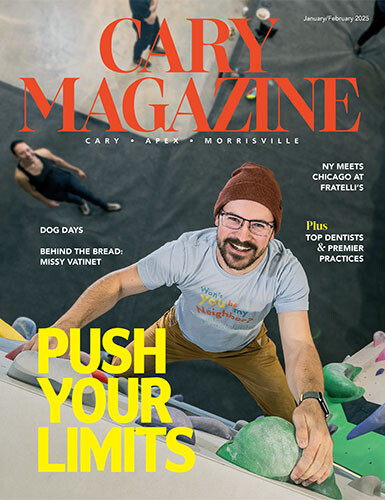


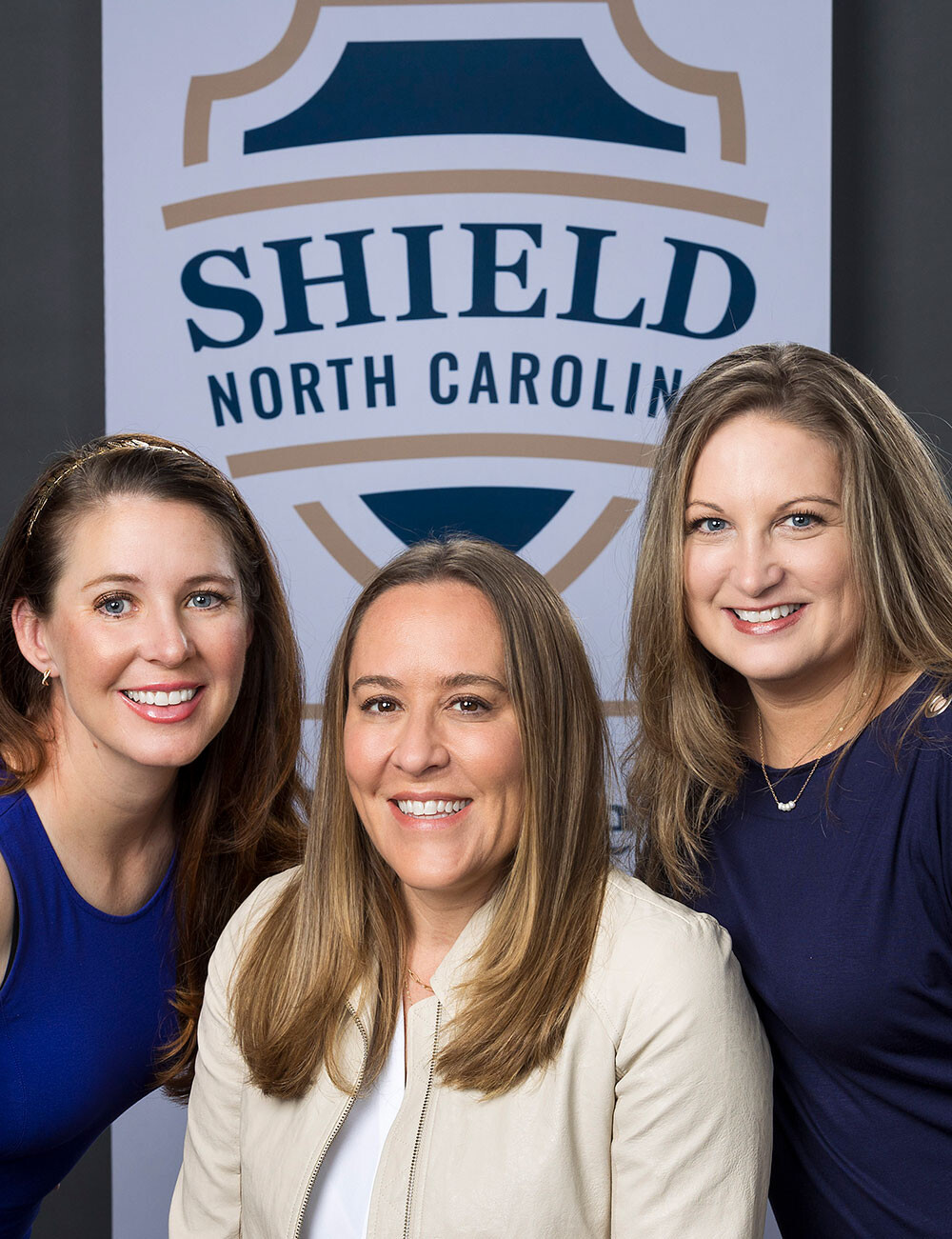


A wonderful introduction to making everyone aware of human trafficking. Human traffickers are predators who are always on the lookout for victims. Congratulations to NC Shield….
If you are interested in having more people join your efforts, I would love to send you my resume. I am bilingual (English and Spanish) and would love to help getting the word out in all the different communities.